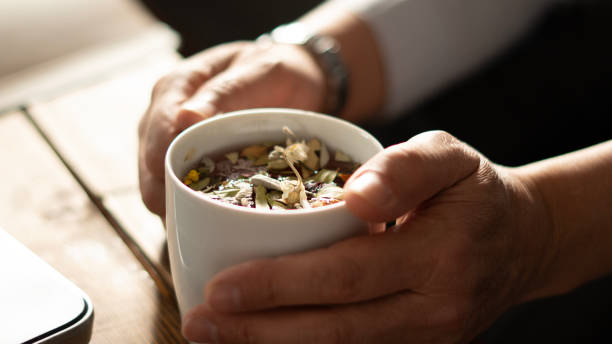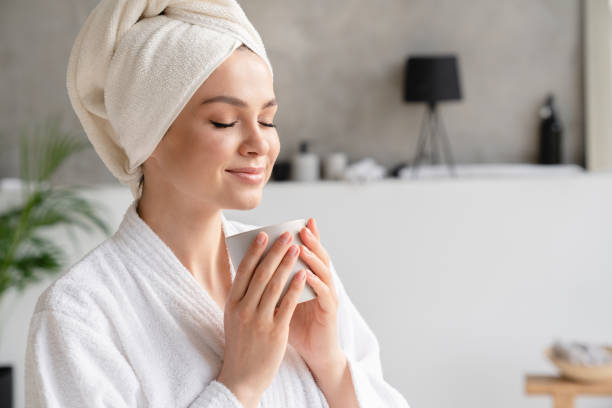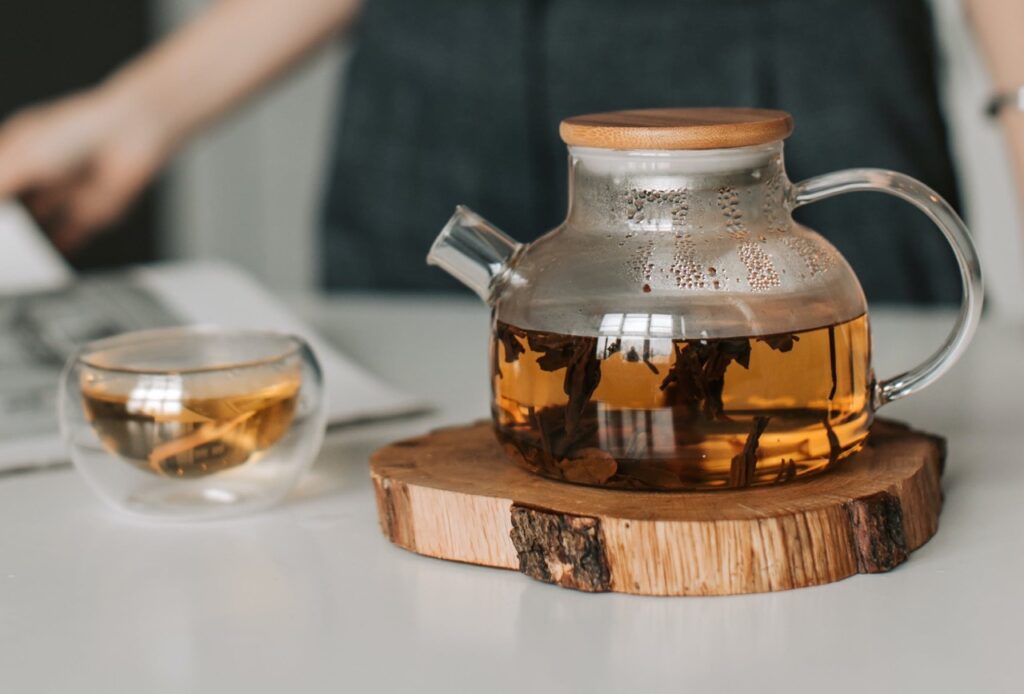Healthy Recipes, What to Eat and Drink
What Are Anti-aging Teas Seniors Can Drink
As we age, our skin loses suppleness and wrinkles form. While aging is a natural process, there are methods for slowing it down and keeping our skin appearing young and healthy. One approach to accomplish this is to drink anti-aging teas.
Tea has been enjoyed for hundreds of years due to its medicinal characteristics and health advantages. Antioxidants in anti-aging teas help to protect our skin from free radical damage. Free radicals are unstable chemicals that can damage cells and accelerate the aging process. Drinking anti-aging teas can help seniors prevent their skin from harm and keep it looking young and healthy.
There are numerous varieties of anti-aging teas that elders can consume. Some of the most popular varieties are green tea, white tea, and chamomile tea. Each of these teas offers distinct health benefits that can help elders combat the effects of aging. Seniors who incorporate these teas into their daily regimen can keep their skin looking young and healthy for years to come.

Understanding Anti-Aging Teas and Their Properties
Anti-aging teas are popular among seniors due to their potential health advantages. Anti-aging teas contain components that can slow down the aging process and improve general health. In this section, we will look at the qualities of anti-aging teas and what makes them effective.
Antioxidants and Their Role in Anti-Aging
Antioxidants are chemicals found in a variety of foods, including teas, that can protect the body from free radicals. Free radicals are unstable chemicals that can damage cells and accelerate the aging process. Antioxidants, which neutralize free radicals, can help down the aging process and lower the risk of some diseases.
Catechin is a powerful antioxidant present in several anti-aging teas. Green tea contains a high concentration of catechin, a type of polyphenol. It has been demonstrated to provide a variety of health benefits, including lowering the risk of heart disease and certain types of cancer.
Types of Teas and Their Anti-Aging Compounds
Different teas contain various components that can help slow down the aging process. Here are some instances.
- Green tea is one of the most common anti-aging teas. It is high in catechin, which has been linked to a variety of health advantages, including a lower risk of heart disease and certain types of cancer. Green tea also includes polyphenols and flavonoids, which can aid the body fight free radicals.
- White tea is an anti-aging tea that is high in antioxidants. It is the least oxidized and therefore the purest of all teas. White tea includes significant levels of collagen and elastin, both of which help to keep the skin looking youthful.
- Oolong tea is light in color and flavor, yet it is rich in anti-aging properties, particularly for the skin. It is high in antioxidants and can help minimize wrinkles and remove age spots. Oolong tea also brightens the skin and improves bone and dental strength.
Incorporating anti-aging teas into your daily routine may help to reduce the aging process and enhance your overall health. However, it is vital to remember that anti-aging teas are not a cure-all and must be used in conjunction with a balanced diet and lifestyle.

Popular Anti-Aging Teas for Seniors
As we age, our skin loses suppleness, and wrinkles form. Fortunately, various types of tea can help halt the aging process and keep our skin looking young. Below are some of the most popular anti-aging teas for seniors:
Green Tea and Its Anti-Aging Benefits
Green tea is one of the most popular anti-aging drinks available, and with good reason. It contains antioxidants known as catechins, which help protect the skin from free radicals. Free radicals are chemicals that can harm cells and contribute to ageing. Seniors can help protect and maintain the youthful appearance of their skin by drinking green tea on a regular basis.
Black Tea and Heart Health
Black tea, another popular beverage, has been found to have anti-aging properties. It includes antioxidants called theaflavins, which have been linked to improved heart health. By increasing blood flow and decreasing inflammation, black tea can help seniors maintain good heart health as they age.
Herbal Teas and Skin Health
Herbal teas including chamomile, hibiscus, and rooibos are also beneficial for keeping good skin. Chamomile tea has anti-inflammatory characteristics that can reduce redness and irritation, whilst hibiscus tea has antioxidants that can protect the skin from damage. Rooibos tea is also high in antioxidants, which have been proved to benefit skin health and minimize wrinkles.
Overall, there are numerous types of tea that can aid elders in maintaining healthy skin and slowing the aging process. Seniors can benefit from the numerous health benefits of these teas by including them into their daily regimen.

Incorporating Anti-Aging Teas into Your Daily Diet
As we get older, it’s crucial to pay attention to our daily diet to ensure that we’re getting enough nutrients to keep our bodies healthy. Drinking tea is an easy approach to add anti-aging benefits into our everyday routine.
Tea Drinking Rituals for Longevity
Tea drinking has a long history in many civilizations, and for good reason. Not only does it promote peace and relaxation, but it also provides a number of health benefits. To maximize your tea drinking experience, try incorporating these rituals into your daily routine:
- Take a moment to settle down and sip your tea. Instead of racing through your day, take the time to relax and decompress.
- Use high-quality tea leaves and filtered water to improve the flavor and health benefits of your tea.
- Experiment with various types of tea to determine which ones work best for you and your taste buds.
By including tea drinking into your daily routine, you may reap the benefits of its anti-aging effects while also taking the time to slow down and enjoy the present moment.
Balancing Caffeine Intake with Herbal Options
While tea contains caffeine, it is crucial to balance our caffeine use with herbal alternatives. Too much caffeine can cause jitters and insomnia. To avoid these adverse effects, consider including herbal teas into your daily regimen.
Herbal teas, such as chamomile, peppermint, and rooibos, are caffeine-free and provide numerous health advantages. Chamomile promotes relaxation and sleep, peppermint aids digestion, and rooibos contains anti-aging qualities. By including these herbal options into your regimen, you can reap the advantages of tea while avoiding the harmful side effects of excessive caffeine.
Including anti-aging teas in your daily routine is an easy approach to improve your general health and well-being. By taking the time to enjoy a cup of tea and experimenting with different varieties, you can discover which ones work best for you and your body.

Additional Health Benefits of Anti-Aging Teas
Anti-aging teas are not only effective at slowing the aging process, but they also have other health benefits. Here are some of the advantages of anti-aging teas.
Digestive and Weight Management
Drinking anti-aging teas can help with digestion and weight management. Green tea, for example, includes catechins, which assist to reduce intestinal inflammation and aid digestion. Furthermore, research have shown that consuming green tea can improve metabolism and aid in weight loss. Oolong tea is another excellent alternative for weight management because it helps to reduce fat formation in the body.
Immune Support and Disease Prevention
Anti-aging teas can also help strengthen immunity and prevent sickness. For example, white tea includes polyphenols, which aid in the battle against dangerous germs and viruses in the body, so boosting the immune system. Furthermore, studies have found that drinking white tea can lower the risk of heart disease, cancer, and diabetes.
Anti-inflammatory and Heart Health
Anti-aging teas are also high in antioxidants, which assist to reduce inflammation in the body, which is associated with a variety of chronic conditions. For example, black tea contains flavonoids, which aid in heart health by lowering blood pressure and cholesterol levels. Similarly, hibiscus tea has been linked to decrease blood pressure and better heart health.
Finally, anti-aging teas provide numerous health benefits beyond simply reducing the aging process. Drinking anti-aging teas can help with digestion, weight management, immune support, chronic disease prevention, and cardiovascular health. Including these teas in your daily routine will help enhance your general health and well-being.
Conclusion
As I conclude this exploration, it’s essential to note that while these teas offer potential health benefits, they should complement, not replace, a well-rounded and balanced diet. Seniors are encouraged to consult with healthcare professionals before introducing new teas into their routine, especially if they have pre-existing health conditions or are on medication.
Incorporating anti-aging teas into a senior’s lifestyle is not only a flavorful endeavor but also a mindful and health-conscious choice. It’s about savoring the simple pleasures while nourishing the body from the inside out. Here’s to a cup of wellness and embracing the journey of aging with grace and vitality.
Journey of self discovery


